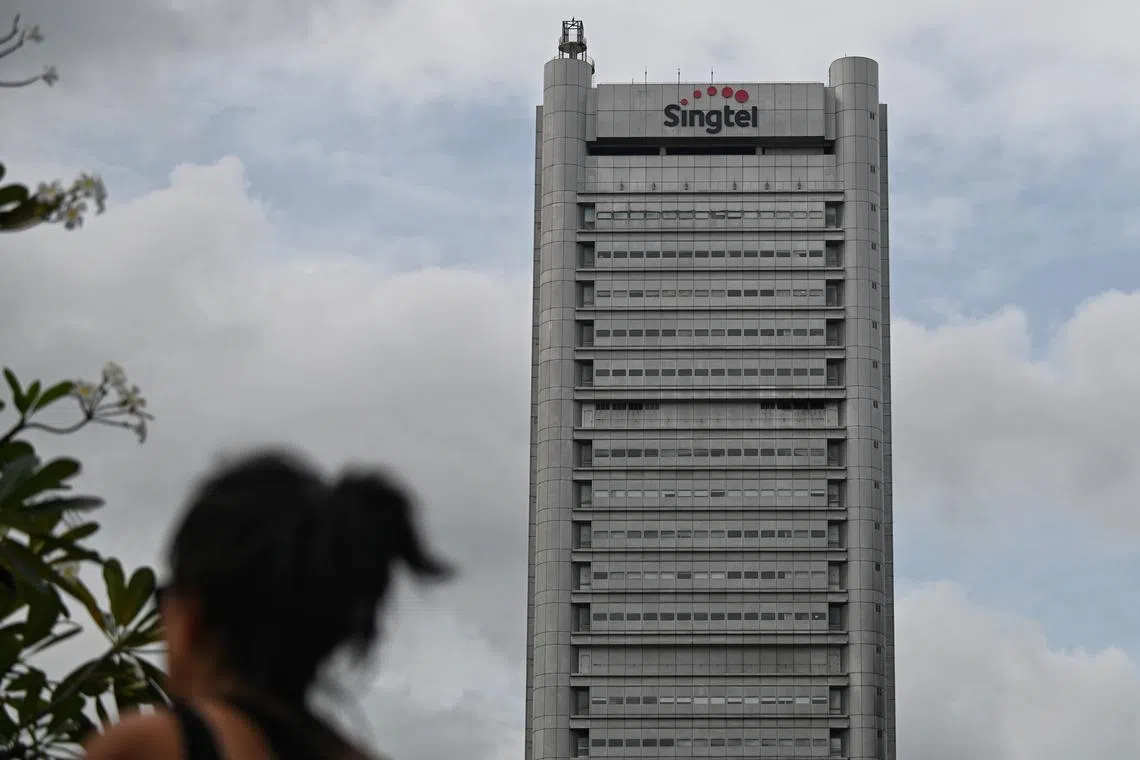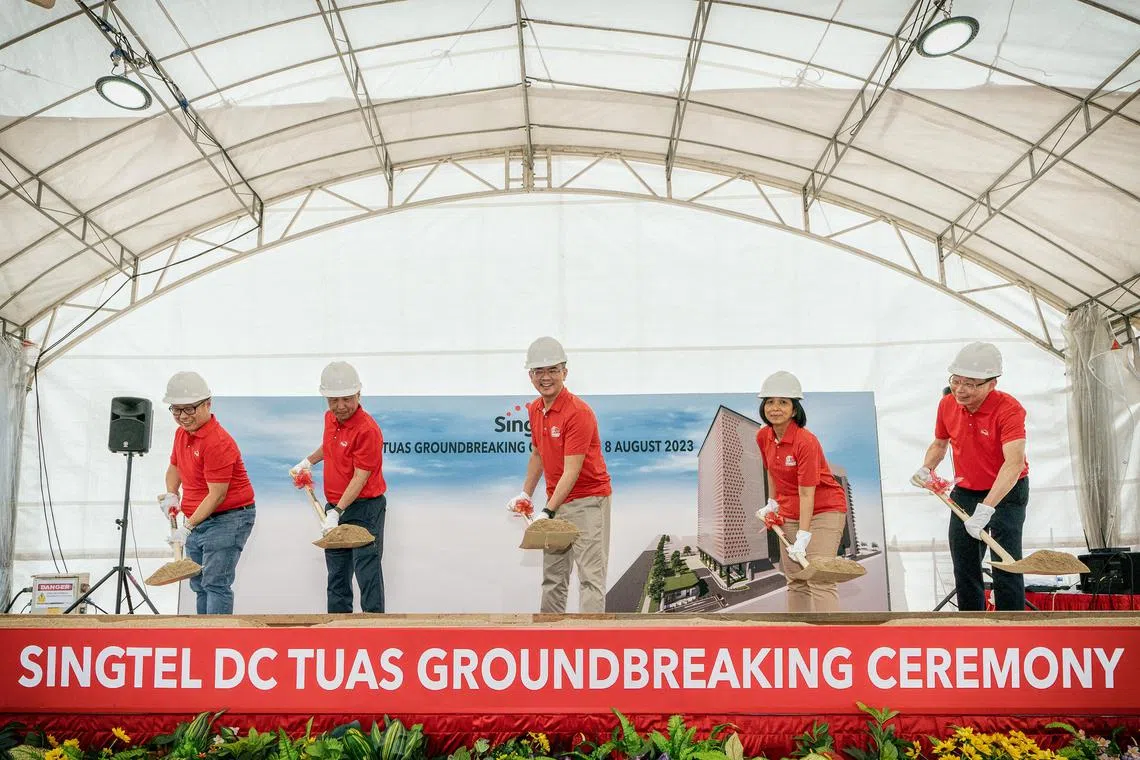Singtel to sell 20% stake in regional data-centre business to KKR for up to $1.1 billion
Sign up now: Get ST's newsletters delivered to your inbox

The amount KKR is paying for the stake values Singtel's regional data centre business at $5.5 billion.
PHOTO: ST FILE
SINGAPORE – A giant American private equity group will commit up to $1.1 billion for a 20 per cent stake in Singtel’s regional data-centre business.
Singtel told the Singapore Exchange on Monday that the telco has reached a “definitive agreement” with KKR & Co, in the first collaboration between the firms.
The amount KKR is paying for the stake values the regional data-centre business at $5.5 billion.
Singtel shares rose on the news, reaching an intraday high of $2.43 at the opening bell. Subsequently, it closed at $2.41 on Monday, up one cent or 0.4 per cent.
Its group chief financial officer Arthur Lang told The Straits Times the valuation is “extremely attractive” and “a massive validation of the segment’s latent asset value”.
Industry estimates put the imputed valuation – as a multiple of Ebitda, or earnings before interest, taxes, depreciation and amortisation, a measure of a business’ financial health – in the high 30s.
In comparison, valuations of other data-centre companies tend to be around the low 20s.
Ultimately, the deal – to be completed by the fourth quarter of 2023 – will not only shed light on the value of Singtel’s key assets but also provide investors with a better sense of where the group’s share price ought to be.
Mr Lang believes Singtel’s shares – which are trading at about 7.5 times Ebitda – are “severely undervalued”, but the KKR deal will enable the market to more accurately price the entire group through the sum of its parts.
“With more than $6 billion being unlocked since we embarked on our strategic reset two years ago, we continue to focus on unlocking value for the benefit of our shareholders,” he said.
The mega deal gives KKR the option to raise its stake to 25 per cent at a pre-agreed valuation by 2027 in the regional data-centre business, which falls under Digital InfraCo, the group’s standalone infrastructure unit
Digital InfraCo chief executive Bill Chang said KKR’s investment “underscores the quality of our data-centre portfolio and confidence in our plans to scale the business” and that the proceeds from the stake sale will fund the building of “a pipeline of growth in the regional platform”.
The fresh capital will accelerate the group’s aim of breaking into South-east Asia and also support emerging demand from generative artificial intelligence (AI) users, with the next-generation data centres likely to make an appearance in the next 18 to 24 months, he noted.
The higher-density designs are needed to cope with the increased AI workload, and novel ways of cooling the servers are also a must because they generate a lot more heat.
This is where Singtel will be able to “tap KKR’s expertise in investing in data centres and critical telecommunication infrastructure globally”, Mr Chang said.
In addition to its existing operations here, Digital InfraCo had announced projects in Tuas, Bangkok and Batam with a combined capacity of more than 155 megawatts (MW) that will be operational by 2025. This capacity could be scaled up to 200MW.
There are also plans to expand elsewhere in the region, with the unit exploring opportunities in Malaysia and other markets.
However, because the business is very capital-intensive, there is a need to bring in partners “that will grow with us”, Singtel’s Mr Lang said.
“KKR is a highly credible partner in the data-centre space, and we look forward to our strategic partnership in scaling up the platform to become a meaningful growth engine for Singtel,” he noted.
Mr Lang said the investment horizon for private equity firms like KKR is between five and 10 years, adding: “This gives us a sufficiently long runway to grow the business, after which, we will assess (our) options.”
He noted that these could mean that KKR’s eventual exit strategy might entail selling its stake in the business, spinning it off as a separate listed company or merging with other firms.
“This is an integral business for Singtel and it is here to stay. The important thing is to attract both the right investors and the smart money,” Mr Lang said.
Commenting on the deal, DBS analyst Sachin Mittal said KKR’s valuation of the regional data-centre business “is 60 per cent higher than our estimate and could benefit the stock price by 4 to 5 per cent in our estimates”.
He added that the consensus is likely to raise total annual dividend per share to 14.9 cents over the next three years.

Breaking ground for Singtel’s Tuas data centre last month were (from left) Singtel Group CFO Arthur Lang, CEO Yuen Kuan Moon, IMDA chief executive Lew Chuen Hong, IMDA deputy chief executive Aileen Chia, and Digital InfraCo CEO Bill Chang.
PHOTO: SINGTEL
Mr Mittal noted that KKR seems to have valued the business segment towards the higher end of the earnings multiples, when compared with its peers.
However, the growth prospects for the regional data-centre business are quite attractive, given that its existing capacity will more than double by the end of 2025.
“This validates Singtel’s approach in working with its associates in Thailand and Indonesia, along with renewable power providers in these markets to target mainly hyper-scalers, as well as enterprises to an extent,” he said.
“There is capacity shortage for such data centres in Singapore, due to supply-side bottlenecks, and Singtel is working to fulfil this spillover demand to regional locations, such as Batam and Bangkok,” he said.



